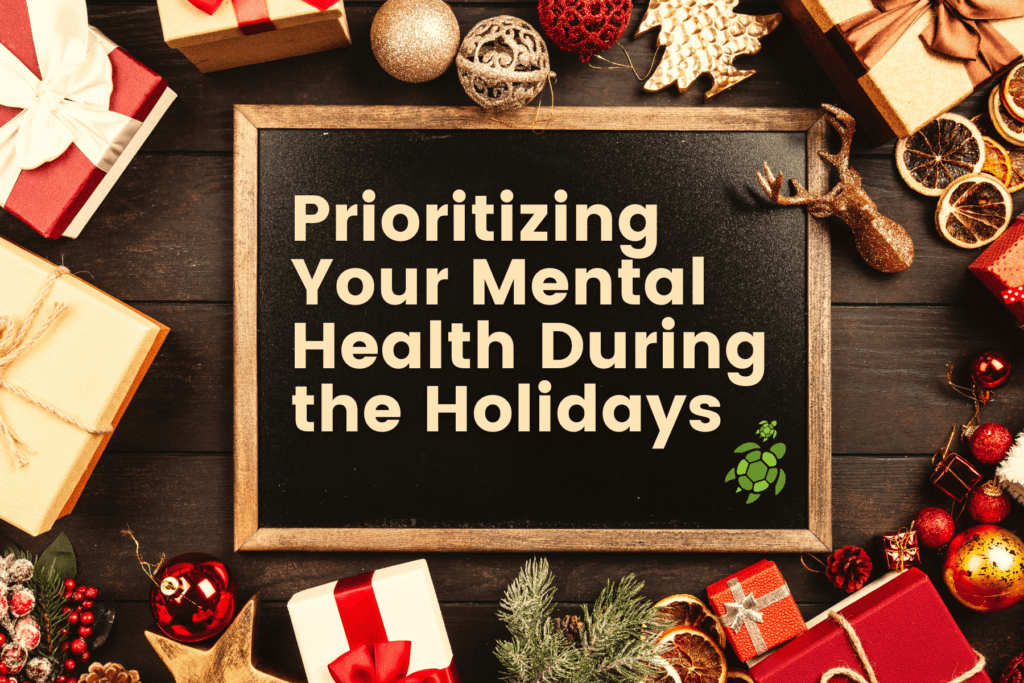Protecting Your Mental Health this Holiday Season
The holidays can bring stress, loneliness, and emotional exhaustion. Learn practical strategies and coping skills to protect your mental health during this season.

Dr. Vicki Bolina
Executive Clinical Director

The holiday season is upon us - no matter what you and your family celebrate, it is a time that is often painted as an occasion of joy, connection, and celebration. But for many, it can also bring stress, loneliness, grief, financial pressure, and emotional exhaustion. As a psychologist, I see this paradox every year: the season that promises warmth and togetherness can also trigger anxiety, depression, and burnout.

Different ways that holidays affect Mental Health
Let's talk about how to protect your mental health this holiday season—with practical strategies, and coping skills that truly work.
There are many reasons as to why some folks can feel extra pressures during this time. See if any of them resonate with you........
Expectations and comparisons creating pressure to perform or feel a certain way.
Family dynamics often reactivating old conflicts and unresolved issues and unsaid things.
Changes to routines that disrupt sleep, exercise, and eating patterns which can increase stress.
Loss and loneliness are amplified by cultural messaging about togetherness.
Financial and time pressures increase anxiety.
If you have acknowledged even one reason above, what can you do to make sure you are protecting your mental health this holiday season? Here is a checklist of items that you can start on today!

Support mental health this holiday season
1. Set Boundaries—And Stick to Them
- Say no early and clearly to events or obligations that drain you.
- Limit time with toxic individuals, even if they're family.
- Protect your time for rest and self-care.
- Protect your time, energy, and personal and professional limits.
2. Set Realistic Plans
- Decide in advance which events you will attend and how long you will stay.
- Use scripts to decline invitations.
- Make a loose schedule that allows for rest, social time and last-minute changes.
3. Practice Coping Skills
- Acknowledge your feelings without judgment. It's okay to feel sad, anxious, or overwhelmed during this season. Notice your emotions without judgement and respond slowly rather than reacting right away.
- Use mindfulness techniques like deep breathing, body scans, or guided meditations to stay grounded.
- Use short grounding techniques such as:
- 4-4-4 breathing: inhale 4 seconds, hold 4 seconds, exhale 4 seconds.
- 5-4-3-2-1 grounding: Name 5 things you see, 4 you can touch, 3 you hear, 2 you smell, 1 you taste.
If you want more guidance on the techniques listed here, please contact one of our providers at Hope WMC Our Providers.

Prioritizing Your Mental Health During the Holidays
4. Limit Social Media and Comparison
- Schedule specific windows for scrolling and remove apps for a specific time period.
- Create New Traditions if you would like. If old traditions bring pain, start fresh! Host a "Friendsgiving," volunteer, or take a solo trip during the holidays to get away.
- Choose relationships and activities that genuinely replenish you.
- Rituals can be healing—light a candle for someone you miss, write a gratitude letter, or cook a dish that brings you comfort.
5. Preserve Routine in Small Ways
- Keep consistent wake and sleep times within 60 minutes of your usual schedule.
- Fit 10–20 minutes of movement into your day and prioritize a balanced meal at least once daily.
- Prepare for difficult conversations. Choose one goal for the conversation, practice short boundary statements, and plan an exit strategy if emotions escalate.
- Start a quiet ritual to honor grief or a loved one you lost or make a memory box.
6. Financial and Gift Planning
- Set a clear gift budget early, use experiences instead of costly items, and communicate expectations within your circle both family and friends.
- Brainstorm gift ideas that do not involve money such as:
- Offering your time to someone
- Offering to help a loved one with cooking or gardening
- Craft using materials you already have at home
- Create a scrapbook of memories together such as movie ticket stubs, pictures etc.
7. Build in Recovery Time
- Schedule downtime after social events so you can recharge.
8. Social Support and Communicating Needs
- Ask for help specifically. Request specific support like childcare, meal prep, or help with errands.
- Use ally agreements. Partner with one trusted person who understands your limits and can provide a gentle exit cue if you need to leave an event.
- Offer and accept connections. Host a low-key gathering, propose a shorter visit, or arrange one meaningful event rather than many formal obligations.

Season's Greetings
Season's Greetings
The holidays are not a test of your worth, productivity, or popularity. They're an opportunity to reconnect—with others, with meaning, and most importantly, with yourself. So, this season, be gentle with yourself, celebrate what you can. And remember: mental health is not a luxury—it's a necessity.
If at any point you would like more guidance, or if low mood, anxiety, or intrusive thoughts interfere with daily functioning, contact one of our providers at Hope Wellness Medical Center.
Wishing you and your loved ones a happy and healthy holiday season.
Dr. Vicki Bolina Executive Clinical Director Clinical Psychologist

About Dr. Vicki Bolina
Executive Clinical Director
Licensed clinical psychologist specializing in adolescent and young adult mental health.